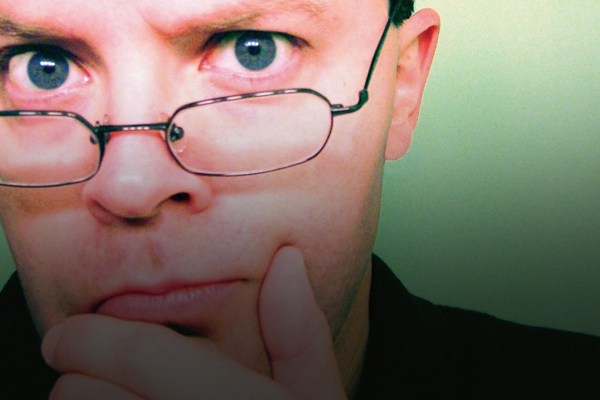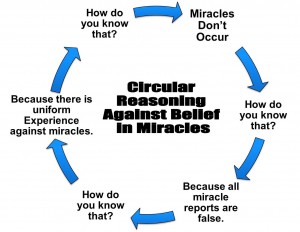
Some Reject Ra”shun”ally
Sometimes folks simply have rational doubts based on the evidence. You’ll recognize this form of resistance when you hear someone say something akin to, “I need more evidence. I’m not convinced.” For those of us who have taken the time to prepare ourselves as good Case Makers, this is the kind of skeptic we are hoping for; someone who’s resistance is grounded in a lack of information. Unfortunately this seldom the kind of person we encounter.
Some Reject Emo”shun”ally
Many people have doubts that are purely emotional. You’ll recognize this form of resistance when you hear someone say something like, “I know a lot of hypocritical Christians. If that’s what Christianity is about, I want no part of it.” Some skeptics have been injured or offended by Christians and now struggle to overcome negative feelings that prevent them from evaluating the case fairly.
Some Reject Voli”shun”ally
When I was an atheist, I denied the truth for volitional reasons. I was willfully resistant and refused to accept any argument offered by Christians I knew. In fact, I actually hated the idea of God and all it represented. I was happy running my own life; I was stubbornly independent. People like me typically say things like, “I don’t care if it is true, I’m not changing my life.”
If you’re a Christian trying to make the case for what you believe, recognize that your jury is filled with all three kinds of people, and only the first group will probably be willing to listen to your presentation. I’ve discovered most people actually fall into the third category; their willful resistance to the truth actually prevents them from fairly examining the case for Christianity. Frank Turek offers an excellent example of this in his “I Don’t Have Enough Faith to Be an Atheist” presentation. As part of his four step argument, he engages the issue of miracles, and offers a brief example of how a volitional presupposition can actually prevent you from recognizing a miracle, even if one occurred in your own life.
David Hume famously argued against miracles, on the basis that we humans have no “uniform experience” of such events. But if we start with a volitional presupposition against the miraculous, this willful foundation will prohibit us from any fair, rational inference from our observations. In other words, we know the experience against miracles to be “uniform” only if we accept all reports of miracles as false. And we know all reports to be false only if we begin from the position miracles have never occurred. In essence, our volitional resistance leads us to reason in a circle.
While you and I can do our best to present the evidence to our unbelieving friends, there is clearly a foundational, presuppositional problem in the heart of man. Our own desires and love of autonomy (our rebellion from God) typically stand in the way of our investigation. I am an evidentialist; I believe in the power of the evidence when presenting the case for God’s existence. But I know that God had to do something with my heart before I could see the evidence fairly, and no friend of mine could accomplish this with his or her evidential presentation. So as I share the case with my skeptical friends, I begin by praying God will remove their enmity so they can hear my words with clarity and interest. I know volitional and emotional resistance is often the reason some people will not be convinced. While you and I can do our best to present the evidence to our unbelieving friends, there is clearly a foundational, presuppositional problem in the heart of man. Share on X

J. Warner Wallace is a Dateline featured Cold-Case Detective, Senior Fellow at the Colson Center for Christian Worldview, Adj. Professor of Christian Apologetics at Talbot School of Theology, Biola University, author of Cold-Case Christianity, God’s Crime Scene, and Forensic Faith, and creator of the Case Makers Academy for kids.
Subscribe to J. Warner’s Daily EmailSave
Save
Save
Save
Save
Save
Save
Save
Save
Save
J. Warner Wallace is a Dateline featured cold-case homicide detective, popular national speaker and best-selling author. He continues to consult on cold-case investigations while serving as a Senior Fellow at the Colson Center for Christian Worldview. He is also an Adj. Professor of Christian Apologetics at Talbot School of Theology, Biola University, and a faculty member at Summit Ministries. He holds a BA in Design (from CSULB), an MA in Architecture (from UCLA), and an MA in Theological Studies (from Gateway Seminary).


































Pingback: Why Some People Simply Will Not Be Convinced | A disciple's study
Pingback: Why Some People Simply Will Not Be Convinced | Time For Discernment
Pingback: Why Some People Simply Will Not Be Convinced | THINKAPOLOGETICS.COM
Pingback: Cold Case Christianity: Volitional Resistance to Christianity Often Masquerades as Rational Opposition | Truth2Freedom's Blog
Pingback: Volitional Resistance to Christianity Often Masquerades as Rational Opposition | Cold Case Christianity
Pingback: Is Christian Education Simply a Matter of Religious Indoctrination? | Cold Case Christianity
Pingback: The Third Characteristic of a Healthy Church: A Decision to Live in Awe | Cold Case Christianity
Pingback: Forming Belief Part 2 – “Shunning” Beliefs | The Woodshed
Pingback: Quick Challenge Answer: If the Evidence is So Good, Why Don’t More People Believe? -
Pingback: Why Some People Simply Will Not Be Convinced | Cold Case Christianity – Elders Scrolls
Maren
February 29, 2024 at 4:32 pm
Hi! I’m working on organizing my case in a notebook (per your suggestion!), and closer examining this idea of different reasons not to believe the truth. I’ve been rereading some other resources I have on my shelf as well, and I’m realizing that you might have missed another common reason, which is apathy. Perhaps part of that apathy would even be assuming that you already know what Christianity is about but haven’t thoroughly researched it. Any thoughts on that? Sorry there isn’t a “shun” in apathy. 😉